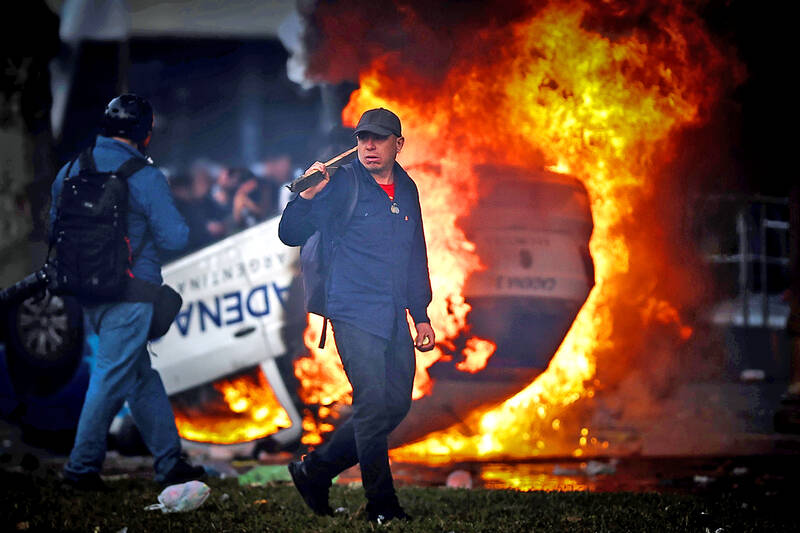Argentine President Javier Milei’s economic reform package yesterday won Senate approval after police and protesters violently clashed outside Congress.
Lawmakers debated a swath of liberalizing reforms proposed by the president, while security forces fired tear gas and water cannons at people rioting outside the day before.
Late on Wednesday, the package won approval “in general” in the Argentine Senate, an important step for Milei’s effort to get his flagship reforms across the finish line.

Photo: EPA-EFE
“For those Argentines who suffer, who wait, who do not want to see their children leave the country ... my vote is affirmative,” Argentine Vice President and Senate leader Victoria Villaruel said after breaking the 36-36 tie in the chamber.
The bill’s separate articles were addressed point by point and approved with modifications in a full vote early yesterday.
The measure now heads to the lower house for a final green light.
The Argentine presidency celebrated the “historic approval” of the economic deregulation law as the “most ambitious legislative reform of the last 40 years.”
Milei’s party is in the minority in both houses of Congress, which he has described as a “nest of rats.”
The Senate went on to discuss a parallel tax reform, which includes reinstating an income tax to tax salaries and pensions.
Scuffles broke out earlier when protesters tried to bypass a system of fences set up between them and Congress.
Officers used rubber bullets and pepper spray against the rioters, who responded by lobbing stones at the police.
Seven people, including five lawmakers among the protesters, were treated at hospital after being pepper sprayed, the Argentine Ministry of Health said.
Dozens of others received medical attention at the scene.
Later, as night fell, thick blocks of shield-bearing officers and others on motorbikes pushed back the protesters, who overturned two cars — one of which belonged to a local media organization — and set them on fire.
At least 10 people were arrested and nine police officers were injured, a spokesman for the Argentine Ministry of Security told reporters.
In one scene, a lone protester stood and held his hand in military salute as he faced a phalanx of police in riot gear, with smoke from cannisters swirling around him.
The office of the president on X denounced “the terrorist groups that with sticks, stones and even grenades, tried to perpetrate a coup d’etat.”
Inside Congress, senators were debating into the night and early the next morning Milei’s reform bill, which was approved with major changes by the Argentine Chamber of Deputies in April.
The whittled-down bill has 238 articles, including declaring a one-year state of economic emergency, allowing Milei to disband federal agencies and privatizing about a dozen public companies including state-owned carrier Aerolineas Argentina.
Others deal with reducing access to minimum retirement allowances and weakening labor protections.
The provisions also envision tax, customs and foreign exchange incentives to encourage investment in the country wracked by economic crisis.

TRAGEDY STRIKES TAIPEI: The suspect died after falling off a building after he threw smoke grenades into Taipei Main Station and went on a killing spree in Zhongshan A 27-year-old suspect allegedly threw smoke grenades in Taipei Main Station and then proceeded to Zhongshan MRT Station in a random killing spree that resulted in the death of the suspect and two other civilians, and seven injured, including one in critical condition, as of press time last night. The suspect, identified as a man surnamed Chang Wen (張文), allegedly began the attack at Taipei Main Station, the Taipei Fire Department said, adding that it received a report at 5:24pm that smoke grenades had been thrown in the station. One man in his 50s was rushed to hospital after a cardiac arrest

SAFETY FIRST: Double the number of police were deployed at the Taipei Marathon, while other cities released plans to bolster public event safety Authorities across Taiwan have stepped up security measures ahead of Christmas and New Year events, following a knife and smoke bomb attack in Taipei on Friday that left four people dead and 11 injured. In a bid to prevent potential copycat incidents, police deployments have been expanded for large gatherings, transport hubs, and other crowded public spaces, according to official statements from police and city authorities. Taipei Mayor Chiang Wan-an (蔣萬安) said the city has “comprehensively raised security readiness” in crowded areas, increased police deployments with armed officers, and intensified patrols during weekends and nighttime hours. For large-scale events, security checkpoints and explosives

PUBLIC SAFETY: The premier said that security would be tightened in transport hubs, while President Lai commended the public for their bravery The government is to deploy more police, including rapid response units, in crowded public areas to ensure a swift response to any threats, President William Lai (賴清德) said yesterday after a knife attack killed three people and injured 11 in Taipei the previous day. Lai made the remarks following a briefing by the National Police Agency on the progress of the investigation, saying that the attack underscored the importance of cooperation in public security between the central and local governments. The attack unfolded in the early evening on Friday around Taipei Main Station’s M7 exit and later near the Taipei MRT’s Zhongshan

A car bomb killed a senior Russian general in southern Moscow yesterday morning, the latest high-profile army figure to be blown up in a blast that came just hours after Russian and Ukrainian delegates held separate talks in Miami on a plan to end the war. Kyiv has not commented on the incident, but Russian investigators said they were probing whether the blast was “linked” to “Ukrainian special forces.” The attack was similar to other assassinations of generals and pro-war figures that have either been claimed, or are widely believed to have been orchestrated, by Ukraine. Russian Lieutenant General Fanil Sarvarov, 56, head